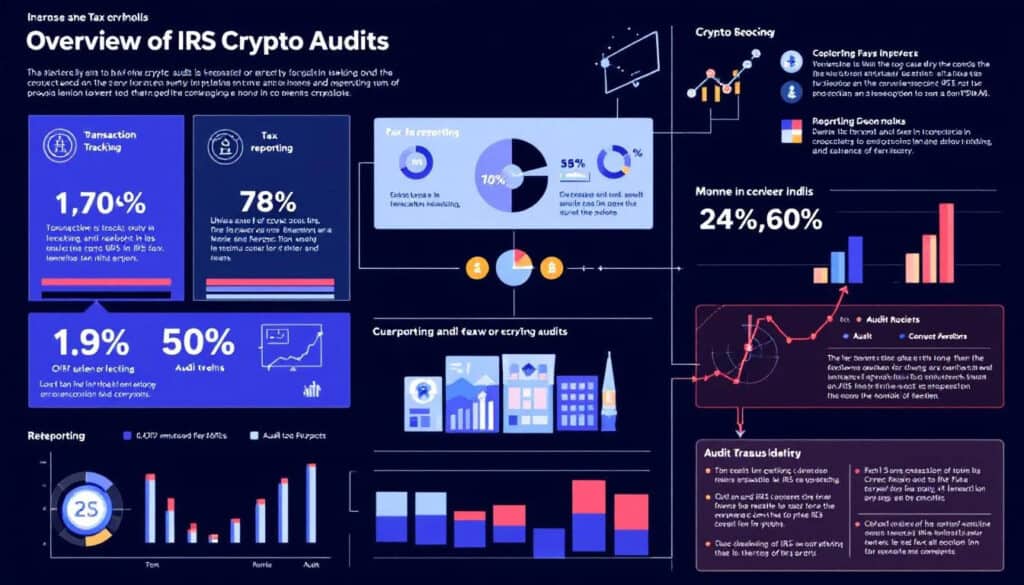Last Updated on April 5, 2025 by Patrick Camuso, CPA
Worried about an IRS crypto audit? These audits review your cryptocurrency transactions to ensure you’re compliant with tax laws. With the IRS cracking down on unreported crypto income, understanding what triggers these audits and how to prepare is essential. This article provides practical tips to navigate the audit process smoothly and avoid common pitfalls.
Key Takeaways
- The IRS is intensifying its scrutiny of cryptocurrency transactions through initiatives like Operation Hidden Treasure, highlighting the need for accurate tax reporting.
- Key triggers for IRS crypto audits include underreported income and discrepancies in reported transactions, making meticulous record-keeping essential.
- Engaging a knowledgeable crypto tax professional can significantly minimize audit risks and ensure compliance with evolving regulations.
Understanding IRS Crypto Audits

The IRS is ramping up efforts to enforce tax compliance among cryptocurrency investors. Operation Hidden Treasure focuses on unreported crypto income, underscoring the agency’s commitment to compliance. This initiative is part of a broader strategy to scrutinize cryptocurrency activities more closely, reflecting the rising importance of digital assets in the modern economy, where income is increasingly taxed.
The audit process can vary widely in duration depending on individual circumstances and the complexity of transactions. While some audits may be resolved quickly, others can drag on, leading to further questioning and review of financial records that are audited. The complexity of managing tax obligations for cryptocurrency traders adds another layer of challenge.
Grasping the IRS’s focus and the complexities of a cryptocurrency audit is crucial. Being informed and prepared can make the audit process less daunting and more manageable.
Common Triggers for a Crypto Tax Audit
Several factors can trigger an IRS crypto tax audit, including:
- Underreporting income, which is a primary culprit.
- Discrepancies in reported income that the IRS investigates.
- Substantial transactions without corresponding income reports, which can raise red flags and invite closer scrutiny. Crypto investors must accurately report income to avoid these issues.
Starting in 2025, Form 1099-DA will require crypto brokers to report extensive transaction information. This underscores the need for thorough and accurate crypto tax reports, as inconsistencies could lead to an audit. Staying informed about these triggers can help you avoid common pitfalls.
How the IRS Tracks Cryptocurrency Transactions
The IRS leverages blockchain technology to track cryptocurrency transactions, utilizing the public ledger to identify blockchain addresses and transaction histories. Despite the pseudo-anonymous nature of digital assets, these digital asset transactions are permanently recorded, making them traceable. The IRS’s ability to monitor digital asset transaction is further enhanced by partnerships with firms skilled in blockchain analysis and virtual currency.
Third-party reporting from exchanges plays a significant role in the IRS’s tracking efforts. Through mechanisms like the ‘John Doe Summons,’ the IRS can compel exchanges to provide information about users. Additionally, the IRS has significantly expanded its workforce to focus on cryptocurrency compliance and tracking.
Knowing how the IRS tracks cryptocurrency transactions underscores the need for transparent and accurate records. Complying with tax regulations and proactively disclosing transactions can significantly reduce audit risk.
What to Expect During an IRS Crypto Audit

An IRS crypto audit usually starts with a letter detailing the issues under review and requesting specific documentation. The audit process can be initiated randomly through statistical formulas, meaning it’s not always triggered by direct cause. Types of audits include correspondence audits handled by mail and more complex office or field audits requiring in-person meetings, including IRS audits.
During the audit, the IRS may request transaction records, wallet addresses, and evidence of taxable events related to cryptocurrency. The agency can audit up to three years of filed tax returns, but this period can extend to six years for substantial errors. Being prepared for these requests is crucial to navigating the audit process smoothly.
Being aware of what to expect during an IRS crypto audit can help you prepare adequately and reduce anxiety. Staying organized and responsive can make the audit process less stressful and more manageable.
Preparing for an IRS Crypto Audit
Preparation is vital for successfully navigating an IRS crypto audit. Key steps include:
- Keep precise records of all cryptocurrency transactions.
- Include wallet IDs and transaction details in your records.
- Maintain organized records to ensure accurate reporting and compliance, especially for high-volume activities.
Taxpayers should maintain detailed transaction logs that include:
- Dates of each crypto transaction
- Amounts involved
- Parties involved in each transaction
- Tracking of crypto gifts or donations and their value at the time of the transaction
- Records of initial coin offerings (ICOs) or other token investments for review
Professional tax advisors can be invaluable in tax preparation and audit preparation by maintaining meticulous records of all transactions. Their expertise can help you navigate crypto tax complexities and minimize audit risks, ensuring you know how to pay any owed taxes and how to get paid. An audit examiner can further assist in ensuring compliance.
Key Documents Needed for a Crypto Audit
Centralized cryptocurrency exchanges are required to report user transaction data to the IRS, which includes personal identification, customer information, and transaction details. Therefore, having your wallet statements ready is essential, as they provide insights into your crypto holdings, transfers, and balances for each exchange.
You should also gather bank account statements to show any transfers to and from cryptocurrency exchanges. Documentation of all crypto trades, including buy and sales receipts confirmations, is crucial for accurate reporting. Having these documents ready ensures you can request records during an audit.
Strategies to Minimize Audit Risk
Implementing the Bulletproof Return method can help minimize your tax bills and audit risks for digital asset income. Simplifying the tax process is essential for reducing audit chances. When reporting crypto-related business expenses, avoid unusually high deductions compared to your income to minimize IRS scrutiny.
Consulting a crypto accountant can provide insights into deductions specific to digital assets for tax purposes, helping to calculate your overall tax burden and optimize your tax positions. Their understanding of IRS guidelines and IRC section can significantly decrease audit risk, enhancing your financial security while considering the tax implications to determine the best strategies within the department.
Addressing pre-audit flag issues with a well-structured plan before an audit can help avoid complications. These proactive steps can significantly reduce your audit risk, making your tax reporting more robust and compliant.
Responding to an IRS Audit Notice
Responding promptly to an IRS audit notice is essential to avoid penalties or automatic tax assessments for the previous tax year. Missing the specified date can lead to stricter repercussions, including formal audits and penalties. If you receive Letter 6173 and believe your tax return is accurate, submit a signed confirmation to the IRS detailing your position.
Being proactive and timely in your proceeding can help mitigate potential issues and demonstrate your willingness to comply with IRS requirements while completing necessary tasks, for example, the complete proceeds of which can help you respond beneficially.
Consequences of Failing an IRS Crypto Audit
Failing an IRS crypto audit can lead to significant consequences. If discrepancies are found, the IRS might require payment of additional taxes along with possible penalties and interest. Missing the response deadline for IRS letters can lead to stricter repercussions, including formal audits and penalties.
In severe cases, individuals may face civil fraud penalties, which can be significantly higher than standard fines. In rare instances, an audit can lead to a criminal investigation if there is evidence of tax evasion or tax fraud, warranting further investigation. These consequences underscore the importance of accurate reporting and timely responses.
Hiring a Crypto-Savvy Tax Professional
Engaging a tax professional who understands cryptocurrency can help ensure compliance and minimize audit chances. Consider the following:
- Hire a CPA or tax attorney specializing in cryptocurrency, especially if you receive serious notices like 6173 or CP2000.
- Use specialized accountants who can accurately track and report complex transactions.
- Ensure compliance with changing regulations through expert guidance.
A knowledgeable crypto accountant can provide proactive tax planning services that consider evolving regulations and market conditions. Many crypto accountants use automated tools to streamline data collection and transaction tracking, enhancing efficiency. Understanding crypto taxes is essential for effective financial management.
Finding a qualified crypto accountant may involve seeking recommendations from cryptocurrency communities or checking online reviewed reviews, as suggested by crypto experts.
Summary
Navigating an IRS crypto audit requires a combination of preparation, understanding, and professional assistance. By staying informed about what triggers audits, maintaining meticulous records, and responding promptly to IRS notices, you can significantly reduce your audit risk.
Engaging a crypto-savvy tax professional can further ensure compliance and provide peace of mind. As the IRS continues to refine its approach to cryptocurrency, staying proactive and informed will be your best defense.
Frequently Asked Questions
What triggers an IRS crypto audit?
An IRS crypto audit is commonly triggered by underreporting cryptocurrency income and carrying out significant transactions without properly reporting the corresponding income. Ensure accurate reporting to avoid such audits.
How does the IRS track cryptocurrency transactions?
The IRS tracks cryptocurrency transactions through blockchain technology, third-party reporting from exchanges, and collaborations with specialized firms in blockchain analysis. This multi-faceted approach enables them to efficiently monitor and enforce tax compliance in the cryptocurrency space.
What documents are needed for a crypto audit?
For a crypto audit, you need to provide wallet statements, bank account statements, and trade confirmations. These documents are crucial for ensuring a comprehensive and accurate assessment of your crypto holdings.
What are the consequences of failing an IRS crypto audit?
Failing an IRS crypto audit can lead to significant repercussions such as additional taxes owed, penalties, and potentially criminal investigations for severe cases. It is crucial to maintain accurate records and comply with tax regulations to avoid these outcomes.
How can a crypto-savvy tax professional help?
A crypto-savvy tax professional can enhance compliance and efficiency in managing your crypto taxes by leveraging automated tools for transaction tracking and offering proactive tax planning strategies. Their expertise helps you navigate the complex regulatory landscape effectively.
About Camuso CPA
Camuso CPA saves you money, time and peace of mind.
We save digital asset investors and digital businesses thousands and cumulatively millions with effective tax planning strategies, accurate accounting and proactive advice.
At Camuso CPA, all our clients are digital asset investors and digital business owners. We’ve developed cryptocurrency specific expertise that allows us to provide tailored solutions to our clients in ways most other firm simply can’t.
Camuso CPA was one of the first CPA firms in the industry to provide their clients cryptocurrency accounting services and tax advisory. Camuso CPA was also the first CPA firms to accept cryptocurrency as a form of payment for professional services.
Learn more about us here.
Next Up
Schedule a time to speak with our team in detail about your taxes and accounting.
Visit our Learning section to find out more about what we do and the resources we offer.
Read our Definitive Guide for Cryptocurrency Taxation to learn about cryptocurrency taxes from an experienced CPA.
Read our Cryptocurrency Tax Planning Guide to learn about saving cryptocurrency taxes from an experienced CPA.
Listen to our podcast: The Financial Frontier






